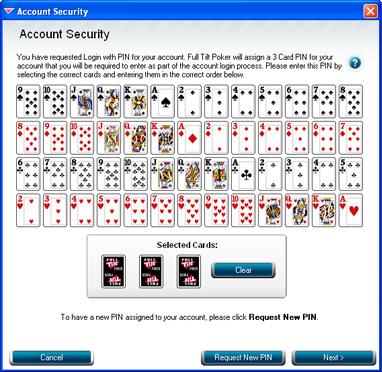Online Poker Security
The issue of security in online poker is one of the most acute and problematic. Well, since such topics are raised quite often on Habré and find high-quality solutions, we would like to hear some good advice from professionals. Such recommendations will allow poker fans to no longer hide money in a bottle, which is sometimes very difficult to find.

Unfortunately, many poker rooms do not pay enough attention to the security of user accounts, limited to only one password. Basically, only industry leaders are trying to protect their customers, on whose balance sheet they often have five-digit amounts, mainly in dollars.
Due to the widespread advertising of online poker, a large proportion of incoming players are not regular Internet users and do not have sufficient knowledge to fully protect their e-wallets, so they are often victims of fraudsters.
')
We have prepared a short article about the protection of online poker accounts, but we hope for a fruitful discussion with the Habr audience, which can push the developers of the online rooms to convenient and secure solutions.
The rapid development of online poker in recent years has led to a sharp increase in remittance between poker rooms and players. Of course, such changes could not be overlooked by Internet fraudsters. Fortunately, there are many electronic payment systems, both domestic (WebMoney, Yandex.Money), and foreign (Moneybookers, NETELLER), whose task is to ensure fast and secure money transfers. And I must say that these systems cope with the task quite successfully.
Security of transfers is very important, but this is only half the battle. A lot of time players spend money on virtual accounts in anticipation of battles at the poker tables, and on the tables themselves. At this stage, they are also exposed to risks from scammers, so operators are doing everything possible to ensure the protection of their customers' funds. This article will discuss the most common methods of cheating in the poker industry and the countermeasures used by leading companies to prevent them.
Like any password-based information system, the poker client is subject to hacking. To complicate the task of hackers during registration, the system requires you to set a long alphanumeric password, but such banal means of protection are insufficient when it comes to really big money - gaming capitals of top professionals can reach eight-digit amounts. For those who are set to play big, operators offer additional security features - for example, eToken:

This device, which was recently a separate post , every 30 seconds generates a new password used to log into the system along with the standard one. In addition, the player can use his mobile phone as such a device by downloading special software. There are other, more exotic ways to get to the game - for example, FullTiltPoker has introduced authentication by selecting the playing cards with the mouse to counteract keyloggers.

As you can see, operators are quite serious about security issues at the program level. However, so far, against the notorious sticker with login and password did not come up with anything, you should not stop on this. What happens if a scammer still has access to a user account? There may be several options: he will try to withdraw money stored on a virtual account from the system, deliberately lose it to his accomplice (the so-called “ chip dumping ”), use a stolen account to launder money from a stolen credit card. The prevention of such situations is engaged in the security service room. When you try to make a withdrawal of funds from the system, the user's activity is checked recently. If this activity seems suspicious to the service staff, the account will be blocked and the transfer suspended. At this point, the verification procedure will begin, during which the distributions played by the user and opponents that won or lost to the user the most money in unnatural situations will be studied in detail. The support service can call the player at the phone number specified during registration and ask them to answer some questions, send scans of documents or receipts in order to identify him.
In addition to the theft of other accounts, fair game can interfere with the so-called. “Play” when a group of players unites and tells each other their cards to gain an advantage over their opponents. This is a gross violation of the rules of the room and, of course, also monitored by the security service. The main signs of such illegal actions are playing from a single IP address and some illogical actions of a group of players in relation to each other. In the event that such a situation is revealed, an investigation is also being conducted and if the fault of the "timplerov" will be proven, their accounts will be blocked, and their opponents will be paid compensation from the funds in these accounts.
Progress spawned not only online poker, but also bots - programs that emit poker game. Today, poker bots are very primitive and use a strategy that is easily exploited by a thinking player. However, poker is a game of people against people, therefore the rooms do everything possible to prevent bots from playing games. For example, the PartyPoker software asks for captcha input if you suspect the use of automatic game systems.
Concluding this cursory review, it is impossible not to mention such an ancient type of fraud as peeping at neighbor's cards and “unsuccessful” shuffling of the deck. Software developers use the most reliable encryption algorithms (for example, 128-bit SSL) to transfer card data to the players' computers, and the data itself is generated using a random number generator that creates uniformly distributed and unpredictable card combinations.
Pokeroff.ru specifically for Habrahabr

Unfortunately, many poker rooms do not pay enough attention to the security of user accounts, limited to only one password. Basically, only industry leaders are trying to protect their customers, on whose balance sheet they often have five-digit amounts, mainly in dollars.
Due to the widespread advertising of online poker, a large proportion of incoming players are not regular Internet users and do not have sufficient knowledge to fully protect their e-wallets, so they are often victims of fraudsters.
')
We have prepared a short article about the protection of online poker accounts, but we hope for a fruitful discussion with the Habr audience, which can push the developers of the online rooms to convenient and secure solutions.
Get to the point.
The rapid development of online poker in recent years has led to a sharp increase in remittance between poker rooms and players. Of course, such changes could not be overlooked by Internet fraudsters. Fortunately, there are many electronic payment systems, both domestic (WebMoney, Yandex.Money), and foreign (Moneybookers, NETELLER), whose task is to ensure fast and secure money transfers. And I must say that these systems cope with the task quite successfully.
Security of transfers is very important, but this is only half the battle. A lot of time players spend money on virtual accounts in anticipation of battles at the poker tables, and on the tables themselves. At this stage, they are also exposed to risks from scammers, so operators are doing everything possible to ensure the protection of their customers' funds. This article will discuss the most common methods of cheating in the poker industry and the countermeasures used by leading companies to prevent them.
Like any password-based information system, the poker client is subject to hacking. To complicate the task of hackers during registration, the system requires you to set a long alphanumeric password, but such banal means of protection are insufficient when it comes to really big money - gaming capitals of top professionals can reach eight-digit amounts. For those who are set to play big, operators offer additional security features - for example, eToken:

This device, which was recently a separate post , every 30 seconds generates a new password used to log into the system along with the standard one. In addition, the player can use his mobile phone as such a device by downloading special software. There are other, more exotic ways to get to the game - for example, FullTiltPoker has introduced authentication by selecting the playing cards with the mouse to counteract keyloggers.

As you can see, operators are quite serious about security issues at the program level. However, so far, against the notorious sticker with login and password did not come up with anything, you should not stop on this. What happens if a scammer still has access to a user account? There may be several options: he will try to withdraw money stored on a virtual account from the system, deliberately lose it to his accomplice (the so-called “ chip dumping ”), use a stolen account to launder money from a stolen credit card. The prevention of such situations is engaged in the security service room. When you try to make a withdrawal of funds from the system, the user's activity is checked recently. If this activity seems suspicious to the service staff, the account will be blocked and the transfer suspended. At this point, the verification procedure will begin, during which the distributions played by the user and opponents that won or lost to the user the most money in unnatural situations will be studied in detail. The support service can call the player at the phone number specified during registration and ask them to answer some questions, send scans of documents or receipts in order to identify him.
In addition to the theft of other accounts, fair game can interfere with the so-called. “Play” when a group of players unites and tells each other their cards to gain an advantage over their opponents. This is a gross violation of the rules of the room and, of course, also monitored by the security service. The main signs of such illegal actions are playing from a single IP address and some illogical actions of a group of players in relation to each other. In the event that such a situation is revealed, an investigation is also being conducted and if the fault of the "timplerov" will be proven, their accounts will be blocked, and their opponents will be paid compensation from the funds in these accounts.
Progress spawned not only online poker, but also bots - programs that emit poker game. Today, poker bots are very primitive and use a strategy that is easily exploited by a thinking player. However, poker is a game of people against people, therefore the rooms do everything possible to prevent bots from playing games. For example, the PartyPoker software asks for captcha input if you suspect the use of automatic game systems.
Concluding this cursory review, it is impossible not to mention such an ancient type of fraud as peeping at neighbor's cards and “unsuccessful” shuffling of the deck. Software developers use the most reliable encryption algorithms (for example, 128-bit SSL) to transfer card data to the players' computers, and the data itself is generated using a random number generator that creates uniformly distributed and unpredictable card combinations.
Pokeroff.ru specifically for Habrahabr
Source: https://habr.com/ru/post/105392/
All Articles